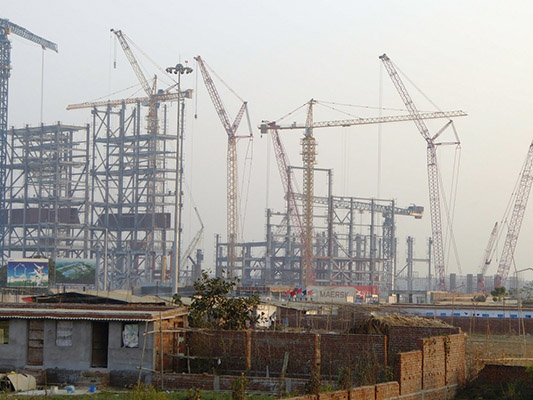By Nair Dasgupta and Geoff Law. First Published on 20 July, 2020
[Featured Image : Adani Power Project at Godda. Photo : Geoff Law/AdaniWatch]
In July 2020, an ABC report brought the dispossession of Indian villagers for an Adani power plant to national attention in Australia. The power plant is located at Godda, about 400 km north of Kolkata. Upon completion, it is intended to be the destination for coal from Adani’s mine in Queensland. Here, AdaniWatch reports on the dirty tricks used to acquire the land farmed by indigenous people for generations.
‘We were charged by the police with their batons,’ said Suryanarayan Hembrom. ‘Most of us were beaten on that day.’
This is what happened at a public hearing that was testing whether landowners would consent to the acquisition of their land for Adani’s massive Godda power station. Suryanarayan was one of those landowners. He was there to state his opposition to the taking of his land by Adani. The meeting was supposed to be a civil affair. Instead, opponents of the project were prevented from entering. And when they protested against their wrongful exclusion, they were assaulted by police acting as ‘enforcers’ for Adani.
The construction site for the Godda power station is located about 400 km north of Kolkata in the Indian state of Jharkhand. It is the power station for which the coal from Adani’s proposed Carmichael coal mine is intended.
Adani’s slogan is ‘growth with goodness’ and the company rejects accusations of involvement with the coercive methods employed at Godda. Nevertheless, the tactics used to acquire land from indigenous farmers at Godda between 2016 and 2018 were nothing short of bullying. Effectively, the land was forcibly seized from its traditional owners by public officials on behalf of Adani.
AdaniWatch visited the Godda area in February 2020, not long before the COVID-19 lockdown, and spoke to local villagers about their experiences at the hands of Adani and the state government. These people are Adivasis – the indigenous inhabitants of this part of India, and their status is supposed to be protected by law. Delivered in Hindi, their accounts of the events that dispossessed them were animated. Despite years of setbacks, these people remained feisty. Suryanarayan explained the ways in which local opposition to loss of land was expressed.
‘It was in 2016 that we first got to hear of the project’, he said. ‘At that time, we had called a meeting in the community, and in our discussions we realised that if the plant is built and the company gets settled here, we will lose everything.’
In June 2016, the process of land acquisition began. The government called for affected people to come forward with relevant documents so that claims for compensation for loss of land could be assessed. In response, the villagers held protest meetings to oppose the process. There was great solidarity within the community.
‘The government officials who came from outside, we blocked them from entering our villages altogether,’ Suryanarayan said. ‘Though they were the ones who had called these meetings, none of them could actually attend them.’
The next major stage in the struggle came with public hearings on 6 December 2016 and on 5 March 2017. The first was to secure the required consent of three quarters of the landowners, as required by the Land Acquisition Act of 2013.
‘What happened here was the company rigged the public hearing,’ said Suryanarayan. ‘The locals were given red cards, and outsiders – people brought from outside the state and paid – were given green cards. There were no official stamps or signatures on these cards either, it was done in the same way how parties rig elections. Only those with green cards were being allowed in, none of the actual landowners of the area were allowed in.’

It was when the landowners realised what was occurring that the confrontation with the police occurred. With dissenters excluded and subdued, the meeting proceeded and the staged provision of assent was treated as legitimate by both the government and the company.
The subsequent hearing in March 2017 was required for the environmental clearance of the project. It was held at a local high school. The company was required to hear claims relating to the environmental damage that its project might cause and present this information in its Environmental Impact Assessment. According to Bhagat, one of the local people opposing the land acquisition, the same illegitimate tactics were carried out by the company and government to exclude dissenters.
‘This time, instead of cards they used turbans,’ Bhagat said. ‘Only those wearing white turbans were allowed in, and the company paid hundreds of people and gave them white turbans. There were over a thousand police officials present – there were more police than public there.’
The villagers called their elected representative, Pradeep Yadav, a member of Jharkhand’s provincial legislative assembly, and a strong opponent of the land acquisition. When he arrived the police finally allowed people in.
‘As soon as we entered the meeting, though, the company officials claimed it was over, and the required consent had been obtained.’
The environmental clearance subsequently obtained by Adani from the Ministry of Environment, Forest and Climate Change, dated 31 August 2017, refers to the ‘public hearing’ of 5 March 2017. It says that the issues raised by attendees consisted of employment, CSR activities, compliance with environmental standards, and ‘greenbelt development in one third (sic) area’. No mention was made of the exclusion of landowners, the premature adjournment of the meeting, or local opposition to the project.
With regulatory requirements thus disposed of, the government of Jharkhand set about acquiring the land from its traditional owners on behalf of Adani. Further irregularities occurred. According to one of the villagers, Balesh Pandey, his father was claimed in the documentation to have passed away, despite being very much alive.
‘We had refused to consent,’ said Balesh. ‘Our land is divided between my father and my two brothers – and none of us consented to part with our land. Later we found out that, in a document at the district administration office, it was claimed that my father is dead, and no consent was required.’
The villagers maintained their opposition to the forced confiscation of their lands. They wrote to the then Chief Minister of the state and to the President of India. In response, government officers attempted to justify the land seizure on the grounds that the power station would serve ‘a public purpose’. Such an argument is supposed to apply only when the infrastructure in question provides a benefit to the Indian public, such as by bringing electricity to local villages. However, the intended use of the Godda power station is for the export of power to Bangladesh via a 400-kV transmission line in accordance with a power-purchase agreement between Adani and the Bangladesh Power Development Board signed on 11 August 2015. This arrangement renders the ‘public purpose’ argument nonsensical. The power is not for the benefit of locals but for export to another country to create profit for Adani. Nevertheless, the confiscation of the lands was in danger of becoming a fait accompli.
As a result, community protests began in earnest. In April 2018, 45 villagers and the local MLA, Pradeep Yadav, participated in a hunger strike. After about twenty days, Yadav was arrested.
‘He was taken away by force’, said Suryanarayan. ‘While he was being led away he pleaded with us to break our strike and not to risk our health. At that time over ten thousand of us surrounded the district collectorate demanding his release, or that we were to be arrested as well. This was probably the peak of the movement.’
But the detaining of Yadav was a turning point. Without their leader, the movement was weakened.
‘Our leader was gone. The company circled us like a hunter, laid its traps and bait, and all the people were caught. There was so much bait and all the people got trapped. Only some of us old birds stayed safe,’ said Suryanarayan, to grim laughter from the others.
In August 2018, company officials from Adani arrived with a police force of 40-50 officers and bulldozers, and forcibly occupied the land. According to one of the villagers’ lawyers, Inam Ahmed, the police and district administration acted as the company’s enforcers.
Manager Hembrom’s family was one of those that faced seizure. In a dramatic scene members of the family pleaded before company officials, which was captured on a video that went viral.
‘Trees on their property were cut down and their crops destroyed, and a barbed wire fence installed under police protection,’ said Inam. ‘Not only this, there is also a burial ground on their property. Under the Scheduled Castes / Scheduled Tribes Prevention of Atrocities Act, the company’s actions would qualify as a desecration of these graves, which is classified as an atrocity.’
In the months since, Manager has taken down the barbed wire fence, reclaimed his land, and defiantly continues to farm in a small patch adjacent to Adani’s site, where there now stands the hulking skeleton of the power plant.
Another of the villagers who faced seizure of his land, Ramji Paswan, has made a formal complaint to the police under the ‘prevention of atrocities’ law about the roughhouse treatment he had received at the hands of the company, to no avail.
‘For many months the police claimed that it was under investigation,’ said Paswan. ‘In April 2019, the police claimed it had completed the investigation and sent a charge-sheet to the court – but it has still not arrived at the court! I had appealed under the Right to Information Act to find out the status of the charge-sheet and an order was issued by the State Information Commission to respond to me within a week’s time, but it has been months since then, with no response.’
The unscrupulous actions on behalf of Adani by the Jharkhand state government continued. In determining the level of compensation, according to the dispossessed farmers, the land was valued at a fraction of its real value. The issue was raised in the legislative assembly by Yadav, resulting in some improvement in the valuation, but the lands were nevertheless acquired by Adani at what many farmers believe to be about one third of their entitlement.
The next communal necessity to suffer was water, large quantities of which were required for construction. In the absence of reservoirs or pipelines, the company has been using groundwater.
‘They are boring wells both in the project site and outside,’ said Bhagat. ‘The company will come to your land and bore a well and then pay you for the water. A lot of the locals have been forced into these arrangements and they have been unable to resist.’
The villagers say that this has affected the groundwater level severely. Water has been turning red within the wells as the water table is reduced. A dirty red residue is left in cooking pots. Some believe that there will soon be inadequate water for village life to continue. But if they leave, they will have nowhere else to go other than the cities.
‘There is no rehabilitation scheme for us,’ said Suryanaryan. ‘There is some compensatory amount but that isn’t enough for anyone. Each person is for themselves. You will be at the mercy of the market. The Adivasi way of life will be taken apart. The connection to the land will be lost. We will have to roam the cities looking for daily wage labour.’
Adani rejects allegations of wrongdoing in the Godda area. A spokesperson for Adani Power Jharkhand Limited (APJL) said that the company has always upheld and respected the local traditions, customs and religious sentiments of the local people since the inception of its work at Godda.
‘It neither supports, nor has been involved in any act of aggression against any of these stakeholders,’ the Adani spokesperson said. ‘There has been no direct acquisition of land by APJL. Land for the Project has been acquired by the Government of Jharkhand, in line with the rules of land acquisition under the LARR Act 2013.’
According to the spokesperson, the rules have been followed both in letter and in spirit.
‘The Government has finalised compensation arrangements for the people impacted and APJL has duly deposited the same as per demand to Government. Compensation of this scale has not previously been given to any Raiyat in Jharkhand to date.’
The company confirmed that the net 1496 MW produced by Godda will be exported to Bangladesh but said that it had in place all of the requisite approvals in place for environmental management, including water usage, and that these are carried out in compliance with all regulatory and sustainability requirements.
Such statements are no reassurance to the people with whom AdaniWatch spoke. They believe that they have suffered at the hands of brutal local authorities, a conniving state government, and a greedy transnational company. Independent semi-government bodies that are supposed to protect the public interest have turned their backs on the issue. Legal safeguards in legislation have been blatantly flouted in order to further the aims of Adani.
These villagers have vowed to maintain the struggle. Sixteen of them have taken a case to the Jharkhand High Court, calling for the state’s confiscation of their lands to be quashed. They are represented by intelligent and combative lawyers. Another case has been filed with the national authority responsible for protecting the environment, calling for the approval of the Godda power station to be similarly quashed. These actions are occurring at a time when the battle against Adani’s coal mine in Australia has brought the Godda situation to broader attention. Meanwhile, Adani has admitted that its work constructing the power station has been slowed down by the COVID-19 pandemic.
Perhaps the tide is about to turn for these brave villagers.
‘We will keep fighting’, said Suryanaryan. ‘From the district court to the high court to the supreme court to the after-life. We cannot stop fighting.’
This is a developing story, and shall be updated as we receive more information.
For a brief dossier on the AdaniWatch Report of Adani Group activities in India
>>> Adani Group’s environmental and social record – an AdaniWatch Report
Disclaimer: This article has not been edited by AlignIndia Editors.
The opinions expressed within this article are the personal opinions of the author. AlignIndia does not take any responsibility for the content of the article.
Geoff Law is a writer and Wilderness conservationist, author and bushwalker, 2010 Churchill Fellow, works with AdaniWatch and BobBrown Foundation, Australia.


